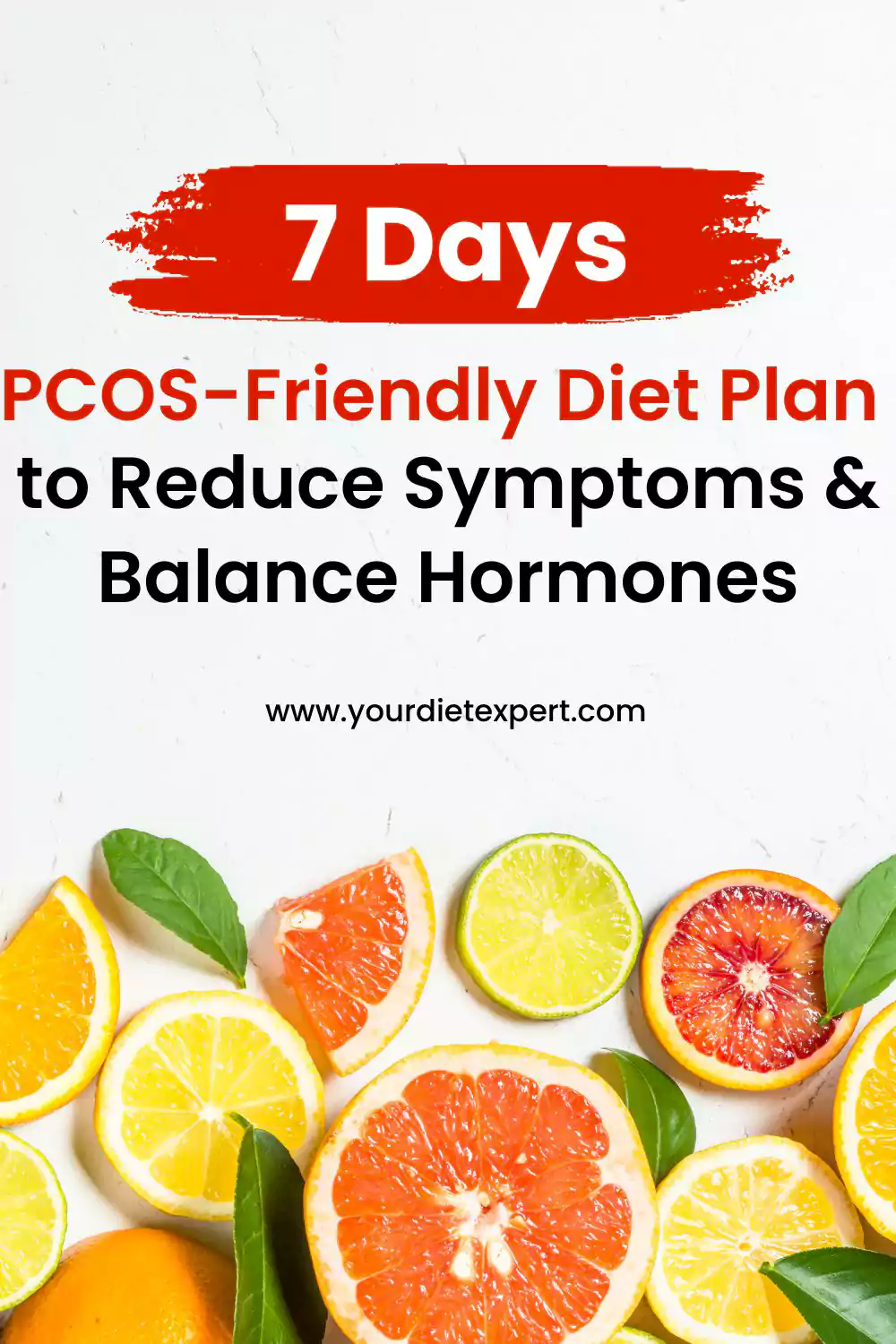Introduction: Why PCOS Needs a Targeted Diet
If you’re living with PCOS, you know it’s more than irregular periods. It’s the hidden imbalance of hormones, the frustrating weight roller‑coaster, the skin breakouts or extra hair, the fatigue and mood dips. What if nutrition could become a real part of your support system — not just a side note?
PCOS affects up to 13 % of reproductive‑aged women. ASRM+3MDPI+3PMC+3 At its core, PCOS is a metabolic‑endocrine condition: insulin resistance, inflammation, androgen excess, menstrual irregularity. Good nutrition doesn’t “cure” PCOS, but it can significantly reduce symptoms, improve cycle regularity, support hormone balance and boost quality of life. Johns Hopkins Medicine+2PMC+2
In this post I’ll lead you through:
- The science‑backed foundations of a PCOS‑friendly diet,
- A structured 7‑day meal plan with real‑life approachable meals,
- Tips for variation, personalization, and longevity, and
- Implementation strategies to maximize results (without feeling overwhelmed).
Let’s get started.
Understanding PCOS: The Role of Diet & Lifestyle
What happens in PCOS?
PCOS is characterised by a set of hormonal and metabolic features: elevated androgens (male‑type hormones) in many cases, irregular or absent ovulation, polycystic ovarian morphology, insulin resistance, chronic inflammation and higher risk of metabolic syndrome. SpringerLink+1
Insulin resistance plays a key role: in some studies, up to 95% of women with PCOS have insulin resistance, even those who are lean. SpringerLink+1 When insulin is high, the ovaries are stimulated to produce more androgens, which disrupts ovulation and worsens symptoms.

Why diet matters
Because PCOS is so closely linked to insulin, inflammation, hormone signalling and metabolism, diet becomes one of the most powerful tools we have. A diet that stabilises blood sugar, reduces inflammation, supports hormone production and clearance, and promotes a healthy weight (or at least prevents further weight gain) can significantly improve outcomes. PMC+1
According to the 2023 international guideline from the American Society for Reproductive Medicine (ASRM) and partners:
“Lifestyle intervention (exercise alone or multicomponent diet combined with exercise and behavioural strategies) should be recommended for all women with PCOS.” ASRM
Key dietary principles for PCOS
Here are the core diet strategies you’ll see reflected in the meal plan:
- Low‑to‑moderate glycaemic index/load carbohydrates: Choose carbs that release slowly, avoiding big insulin spikes. Biomed Pharma Journal+1
- High fibre, whole food, minimally processed diet: Fiber helps with insulin sensitivity, hormone clearance and gut health. Brown Health+1
- Lean protein, healthy fats, plant‑based sources & seafood: Support hormones and satiety, reduce inflammation. Mass General Brigham
- Anti‑inflammatory focus: Reduce refined sugars, processed foods, saturated fats; support with vegetables, omega‑3s, phytonutrients. Johns Hopkins Medicine+1
- Weight/abdominal fat reduction (if relevant): Even modest weight loss (5‑10%) improves cycle regularity, insulin and androgen levels. PMC
With these in mind, let’s walk through your 7‑day PCOS‑friendly diet plan.
The 7‑Day PCOS‑Friendly Diet Plan
How to use this plan
- Each day includes breakfast, lunch, snack and dinner.
- Portions are guidelines — you may adjust based on your caloric needs, activity level, weight‑goals, and clinician/dietitian advice.
- Focus on whole foods, minimal refined sugar, and a balance of protein, fat and slow carbs.
- You can swap meals between days to fit your schedule, but aim to maintain the core structure.
- At the end of the 7 days, use the “Variation & Sustainability” section to keep momentum.
Day 1
Breakfast: Greek yoghurt (plain, low‑sugar) with ½ cup mixed berries, 1 tbsp flaxseed meal, and 1 tbsp chopped walnuts.
Why: Good protein + healthy fat + fibre + low GI berries support insulin and inflammation.
Lunch: Quinoa & chickpea bowl: ½ cup cooked quinoa + ½ cup chickpeas + large handful of spinach + cherry tomatoes + cucumber + olive oil & lemon dressing.
Snack: Apple slices with 1 tbsp almond butter.
Dinner: Baked salmon (4 oz) with steamed broccoli & cauliflower, and a small sweet potato.
Why: Omega‑3 fats reduce inflammation; non‑starchy veg + moderate sweet potato provide slow carb; salmon supports hormone function.

Day 2
Breakfast: Oatmeal (½ cup dry oats) topped with 1 tbsp chia seeds, sliced banana (½), and cinnamon.
Lunch: Turkey or tofu stir‑fry with mixed non‑starchy veg (bell peppers, zucchini, mushrooms) and brown rice (¾ cup cooked).
Snack: 1 oz almonds + handful of berries.
Dinner: Lentil soup with kale, carrot & celery; side salad of mixed greens with olive oil vinaigrette.

Day 3
Breakfast: Smoothie: 1 cup unsweetened almond milk + 1 tbsp peanut or almond butter + ½ banana + 1 cup spinach + 1 tbsp ground flaxseed.
Lunch: Whole‑grain wrap with hummus, grilled chicken/tempeh, lettuce, avocado and tomato.
Snack: Carrot sticks + 2 tbsp hummus.
Dinner: Grilled mackerel (or other fatty fish) with quinoa tabbouleh (parsley, tomato, cucumber, olive oil) and roasted Brussels sprouts.

Day 4
Breakfast: Scrambled eggs (2) with sautéed mushrooms and swiss chard; 1 slice whole‑grain toast.
Lunch: Mixed bean salad (kidney beans + black beans + chickpeas) + large green salad + vinaigrette.
Snack: Greek yoghurt with pumpkin seeds (1 tbsp) and raspberries.
Dinner: Turkey chili: lean ground turkey (or lentil version) with tomatoes, bell peppers, onions, spices, served with brown rice (½ cup) and steamed greens.

Day 5
Breakfast: Cottage cheese (½ cup) with pineapple tidbits (fresh), 1 tbsp sunflower seeds, and cinnamon.
Lunch: Salmon salad: canned wild salmon + mixed greens + cucumber + avocado + olive oil lemon dressing.
Snack: Celery sticks + 1 tbsp almond butter.
Dinner: Whole‑wheat pasta (1 cup cooked) with tomato‑vegetable sauce (zucchini, eggplant, tomatoes), grilled shrimp or tofu, side steamed broccoli.
Day 6
Breakfast: Chia pudding: 3 tbsp chia seeds soaked overnight in unsweetened almond milk, topped with strawberries and slivered almonds.
Lunch: Spinach and kale salad + quinoa + roasted chickpeas + olive oil/garlic dressing.
Snack: 1 oz walnuts + orange slices.
Dinner: Baked chicken breast (or tempeh) with roasted sweet potato wedges and sautéed green beans.
Day 7
Breakfast: Avocado toast: 1 slice whole‑grain bread topped with half avocado, sliced tomato, arugula and cracked pepper; 1 boiled egg.
Lunch: Lentil & vegetable stir‑fry (lentils, bell pepper, zucchini, spinach) over cauliflower rice.
Snack: 1 square dark chocolate (70%+) + handful mixed nuts.
Dinner: Grilled fish or tofu with sautéed swiss chard + wild rice (½ cup) and side salad of mixed greens.
Variation, Personalisation & Long‑Term Sustainability
Swap & Rotate
- You can rotate breakfasts or lunches between days based on convenience.
- Use different lean proteins: chicken, turkey, fish, tofu, tempeh, beans.
- Switch up grains: quinoa, brown rice, bulgur, barley, wild rice.
- Swap in seasonal vegetables.
Mini‑Meal Planning Tips
- Batch cook legumes (chickpeas, lentils, beans) at the weekend for quick meals.
- Prep vegetables ahead (chop/slice) to reduce cooking time.
- Keep healthy snacks ready: chopped veggies + hummus, nuts/seeds, yogurt.
- Use herbs/spices to flavour instead of heavy sauces or creams (which often add hidden sugars/fats).
Portion & Calorie Considerations
- If weight loss is your goal (which often improves PCOS symptoms), aim for a moderate calorie deficit (e.g., 5‑10% reduction). Even modest weight loss improves insulin sensitivity and hormone balance. PMC+1
- If your weight is already in healthy range, focus on metabolic health (insulin sensitivity, fats, fibre) rather than aggressive calorie restriction — because for PCOS, metabolic quality matters even without weight loss. ASRM
Lifestyle Supports
- Aim for 30+ minutes moderate physical activity most days, plus strength training 2×/week. Lifestyle management is first‑line in PCOS. BioMed Central+1
- Prioritise sleep (7‑9 hrs) and manage stress — both insulin resistance and hormone disruption are worsened by poor sleep and high cortisol.
- Keep hydrated, avoid sugary drinks and excess processed foods.
- Monitor cycle tracking: note dates, symptoms, energy, sleep, food — this helps you tailor and stay consistent.
Why Each Food Choice Matters: Deep Dive
- Whole grains/low GI carbs: Choosing oats, quinoa, brown rice over white rice or white bread reduces blood sugar spikes, improves insulin response and is linked with more regular cycles. Biomed Pharma Journal
- Non‑starchy vegetables & leafy greens: These provide fibre, antioxidants and minerals that support hormone clearance and reduce inflammation. Johns Hopkins Medicine
- Lean protein & healthy fats: Protein stabilises blood sugar, supports muscle and hormone production. Healthy fats (olive oil, avocado, fatty fish) help reduce inflammation and support reproductive hormones. PMC
- Legumes, beans, chickpeas: Provide plant‑based protein and fibre, low GI carbohydrates, and help with satiety and insulin control.
- Fish rich in omega‑3s: Omega‑3s reduce inflammatory markers and may improve androgen levels and insulin sensitivity in PCOS.
- Limited refined sugar & processed foods: These contribute to inflammation, insulin spikes, fat storage and hormone imbalance. Healthline
Common Questions (FAQs)
Q: Is there a “best diet” for PCOS?
A: There is no one‑size‑fits‑all diet. However, patterns emphasising low‑GI carbs, high fibre, lean protein, healthy fats and minimally processed foods consistently show benefit in PCOS. PMC+1
Q: Do I need to be very low carb (keto) to manage PCOS?
A: Some studies show benefit of very‑low‑carb or ketogenic approaches (improving weight, insulin, androgens) but these may be difficult to sustain and aren’t required for everyone. MDPI Focus on manageable, balanced low‑GI carbs rather than extreme restriction unless advised by a clinician.
Q: How long until I see results?
A: Some improvements (energy, mood, cycle tracking) can happen in 4–8 weeks. More significant changes (menstrual regularity, ovulation, androgen reduction) may take 3‑6 months or more with consistent diet + lifestyle.
Q: What about supplements?
A: Supplements (myo‑inositol, vitamin D, omega‑3s) may support PCOS management but are adjuncts not replacements for diet & lifestyle. Always consult your healthcare provider. PMC
Q: I’m already at healthy weight — does diet still matter?
A: Yes — PCOS is about more than weight. Even lean women with PCOS may have insulin resistance, inflammation or hormone imbalance. A nutrient‑rich diet improves metabolic health regardless of weight. SpringerLink
Safety & Professional Considerations
- Always talk to your clinician or dietitian before making major changes if you are on medication (e.g., metformin), fertility treatments, thyroid treatment or have other conditions.
- For weight loss: aim for gradual (0.5‑1 kg/week) rather than rapid loss — extreme diets can trigger metabolic slowdown, stress hormones and worsen PCOS.
- Monitor blood sugar, lipids, liver function, if your clinician recommends — since PCOS increases metabolic risk.
- Be cautious with very restrictive diets, fasting‑only approaches or elimination without professional support — they may worsen hormone balance or nutrient deficiencies.
Key Takeaways
- PCOS is best managed with a comprehensive lifestyle approach — diet, exercise, sleep and stress play major roles.
- A 7‑day PCOS‑friendly diet plan gives you a clear, actionable framework to shift to a hormone‑supportive eating pattern.
- Focus on whole, minimally processed foods, low‑GI carbs, lean protein, healthy fats, fibre and non‑starchy vegetables.
- Sustainability is key — set realistic goals, build habits, avoid extremes, and adjust based on your body and cycle.
- While diet alone isn’t a magic cure, it’s a powerful tool you control — that strengthens your body’s resilience, reduces symptoms and helps balance your hormones.




Leave a Reply